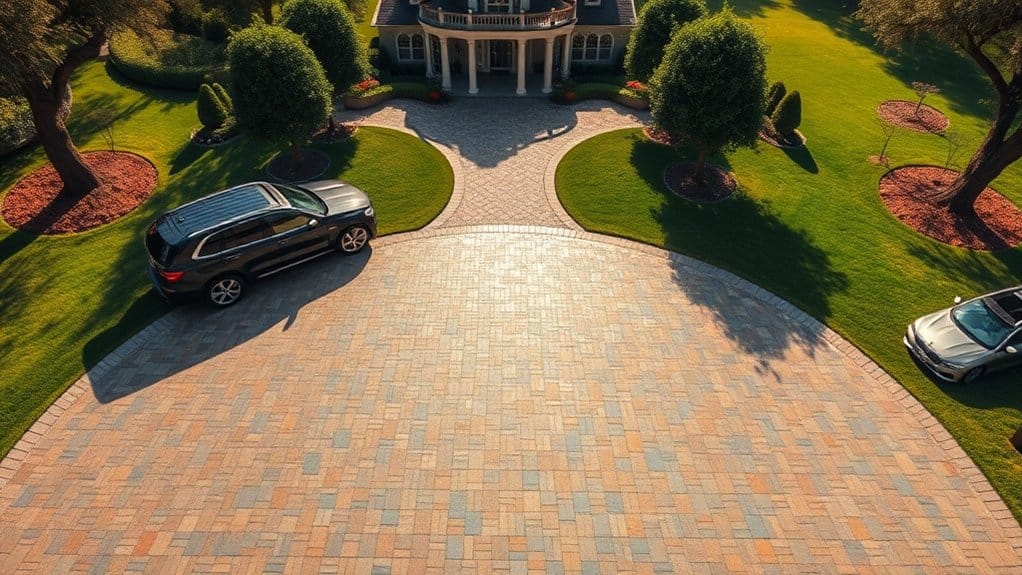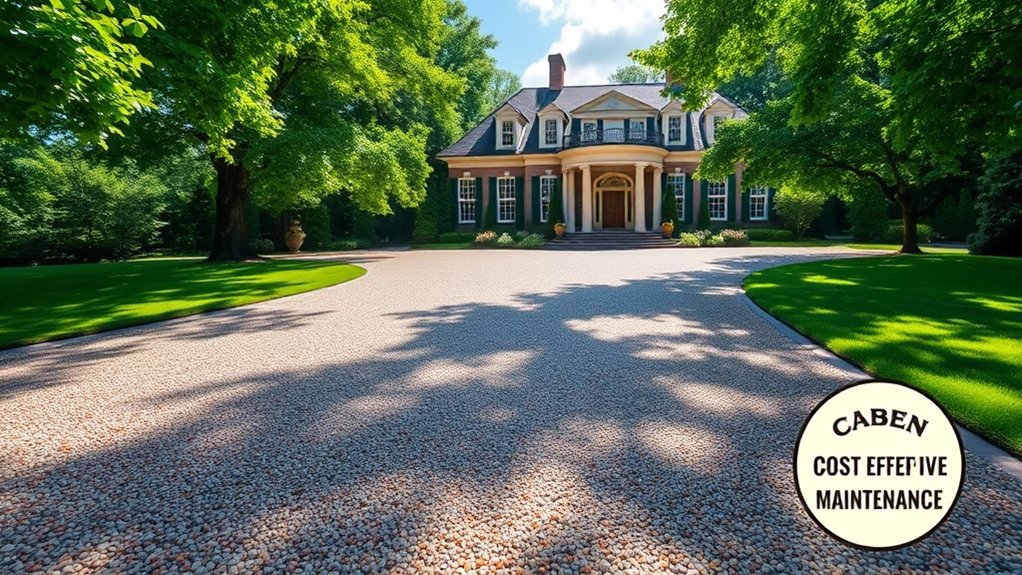Resin-bound driveways work brilliantly for large estates. They easily handle heavy loads, from luxury cars to delivery lorries, without cracking or sinking. The minimal upkeep – just occasional sweeping and power washing – makes them practical for expansive areas. They’re also SUDS-compliant (Sustainable Urban Drainage Systems), which is essential for UK properties, helping prevent waterlogging during our wet weather. Estate owners can choose from various stone colours and patterns to match period properties or modern mansions. Whilst the initial cost might be higher than tarmac, the durability and kerb appeal make it a sound investment for substantial properties.
Key Takeaways
Resin-bound driveways prove ideal for large estates across Britain, with several key advantages:
Strong and Durable
Properly installed resin surfaces easily handle heavy vehicles, from luxury cars to maintenance lorries, when laid with the right sub-base.
Low Maintenance
Once fitted, these driveways need little more than occasional sweeping and jet washing, lasting over 20 years – perfect for substantial properties where frequent upkeep isn’t practical.
SUDS Compliant
The permeable surface meets UK drainage requirements, preventing water pooling even during heavy British rainfall – crucial for expansive driveways.
Stylish Flexibility
Available in countless colours and finishes, resin-bound surfaces complement any property style, from period mansions to modern estates.
Cost Considerations
Though initially pricier than tarmac or concrete, the long-term savings on repairs and maintenance make them a sound investment for larger properties.
Weight-Bearing Capacity for Large Vehicles

A resin-bound driveway’s weight-bearing capacity matters for larger properties. Standard 15-18mm installations can handle vehicles up to 7.5 tonnes, perfect for family cars and transit vans. For heavier vehicles like lorries and HGVs, you’ll need extra reinforcement. The key lies in the sub-base – it must be properly built up to manage weightier loads through either a thicker resin layer or strengthened foundations. Adding geotextile layers and ensuring thorough compaction boosts overall strength. To ensure durability, a strong sub-base is crucial, as a weak foundation could compromise the driveway’s integrity. This is because the proper substrate preparation is critical for the longevity of resin-bound gravel. Skip these steps, and heavy vehicles could damage your surface. Best to chat with your installer about specific weight needs to ensure your driveway lasts.
Durability and Maintenance Considerations

Resin-bound driveways handle heavy vehicles remarkably well, staying solid under lorries and large machinery. Additionally, they can support up to 400 tonnes per square centimetre, making them an ideal choice for large estates. This exceptional durability allows them to withstand harsh weather conditions, ensuring they remain functional year-round. Looking after these surfaces takes minimal effort – just regular sweeping and the odd wash-down, plus resealing every few years. For sizeable properties with frequent vehicle movement, this robust, low-maintenance option proves particularly valuable. Think multi-car households or working farms where vehicles come and go daily.
Heavy Vehicle Impact
Resin-bound driveways can handle heavy vehicles, but proper installation is crucial. Standard setups cope well with vehicles up to 7.5 tonnes – think small lorries and skip trucks. For anything heavier, like removal vans or construction vehicles, you’ll need a beefed-up sub-base.
The key lies in the foundation. A properly compacted hardcore base spreads the weight evenly, much like how a good pair of trainers absorbs impact when running. The resin-bound surface itself is quite tough, resisting cracks better than concrete or tarmac thanks to its flexible nature. This flexibility allows the resin-bound surface to adjust to minor ground movements, ensuring long-term durability under heavy vehicle loads (flexibility benefits). Additionally, the robust resin composition enhances durability and longevity against significant stress from heavy traffic.
Good drainage is vital – standing water can weaken any driveway, especially under heavy loads. Think of it like a soggy garden path that gets muddy underfoot.
To avoid problems, ensure your installer plans the right sub-base thickness and drainage for your specific needs.
For best results:
- Choose experienced installers
- Specify expected vehicle weights
- Get proper sub-base depth
- Ensure adequate drainage
Maintenance Requirements
Regular maintenance keeps your resin-bound driveway in top condition and helps avoid costly repairs.
Sweep weekly and pressure wash every few months with a gentle setting. Check regularly for cracks or colour changes, and sort any issues straight away.
Pull out weeds as soon as they appear, as their roots can damage the surface. For stubborn marks, use a mild soap solution – avoid harsh chemicals that might harm the resin.
It’s worth giving your driveway a thorough once-over after winter to spot any frost damage.
Good drainage and proper installation, combined with these maintenance habits, will keep your driveway looking smart and working properly for years to come.
Compliance With Permeability and Drainage Regulations

Complying with permeability and drainage rules is vital when installing resin-bound driveways in the UK, particularly for larger properties. These surfaces typically meet British drainage standards, as they let rainwater soak through naturally.
Before starting work, check your local council’s planning requirements – some areas have strict rules for bigger projects. For instance, a 100-square-metre driveway might need additional drainage solutions compared to a standard household drive.
Using the right permeable sub-base and following SuDS (Sustainable Drainage Systems) guidelines helps prevent flooding and allows groundwater to replenish properly. A properly installed resin drive in Manchester or Cornwall, for example, should handle heavy rainfall without puddles forming.
Getting these details right isn’t just about following the law – it’s about ensuring your driveway works properly and helps protect the environment.
Plus, it’ll save you headaches with planning officers down the line.
Aesthetic Flexibility for Estate Design

Resin-bound driveways offer remarkable design flexibility for large estates. The option to customise colours and textures ensures your driveway makes a striking first impression whilst keeping up with modern trends.
Choose from a range of natural stones and shades that work perfectly with your estate’s architecture – whether you’ve got a Georgian mansion or a contemporary build. The smooth finish looks particularly smart, and you can even create unique patterns to set your entrance apart.
What’s particularly brilliant is how resin-bound surfaces can handle tricky layouts, working seamlessly with your gardens and landscaping. It’s a practical way to boost your property’s kerb appeal whilst maintaining an upmarket look that suits a grand estate.
Cost Implications for Large Estate Applications

Costing Up Large Estate Resin Driveways
The price of resin driveways for sizeable estates varies hugely. A typical 200-square-metre driveway might cost £8,000-£12,000, with factors like complex curves or slopes pushing costs higher.
Don’t forget the essentials: proper drainage, sub-base work and edging all add to the bill.
Think beyond the upfront costs. While resin surfaces need less upkeep than traditional options, you’ll still want a yearly power wash (around £200) and might need occasional repairs to tackle any damaged areas.
Sound investment planning means considering:
- Ground preparation costs
- Material quality tiers
- Local contractor rates
- Drainage requirements
- Access challenges
A well-installed resin driveway typically lasts 15-20 years, making it worth weighing these costs against long-term benefits.
Initial Investment Breakdown
A resin-bound driveway for a large estate typically costs between £26,000 and £41,000, varying with size and design complexity.
The cost breakdown includes materials at £9-£14 per square metre, with prices reflecting resin quality and chosen aggregate. Essential groundwork costs roughly £60 per square metre to ensure long-term stability.
Labour makes up a substantial portion, as proper installation requires skilled specialists working 15-20 hours or longer.
You’ll need to factor in extra costs for intricate patterns, protecting existing landscaping and sorting proper drainage.
Much like choosing quality building materials for your home, investing in proper materials and installation for your driveway proves cost-effective in the long run.
Understanding these key cost elements helps you budget accurately and ensure your driveway delivers both visual appeal and practical value.
Long-Term Expense Considerations
Long-term costs for resin-bound driveways aren’t just about the initial outlay, particularly for large properties.
Annual upkeep typically costs £150-£300 for standard driveways, though larger estates will need a bigger budget. You’ll need regular power washing, and the surface requires resealing every 3-5 years – both vital jobs for keeping your driveway in top shape.
Smart maintenance helps dodge hefty repair bills down the line. If you’re managing a large estate, bulk-buying materials and scheduling routine work can help control costs.
With proper care, these driveways can last beyond 20 years. It’s worth sorting small issues quickly rather than waiting for major problems to develop, as repairs tend to be costly when left unchecked.
Suitability for Various Vehicle Types

Resin-bound driveways suit most vehicle types when properly installed.
Standard 18mm resin layers handle everyday cars and family vehicles well. For heavier vehicles like lorries or commercial vans, you’ll need a thicker 25mm layer and stronger sub-base.
These beefed-up driveways can support weights between 2,400 to 6,000 lbs per square inch (roughly 170 to 422 kg per square centimetre).
Proper installation is crucial – skimping on foundation work risks cracks and dips forming under heavy loads. The key is matching your driveway’s spec to the heaviest vehicles likely to use it.
Benefits for Coastal Estates

Coastal Estate Driveway Solutions
Resin-bound driveways offer remarkable benefits for coastal properties, standing up brilliantly to Britain’s seaside conditions.
These surfaces deliver practical advantages that protect your investment whilst supporting the environment:
- Built to Last: Handles British coastal weather brilliantly – from driving rain to salt spray and frost – performing better than standard concrete or tarmac.
- Superior Drainage: Soaks up rainfall at 850 litres per square metre per minute, helping prevent flooding and waterlogging common to seafront properties.
- Eco-friendly: Reduces harmful run-off into the sea and local water systems, protecting our coastal wildlife.
A resin-bound driveway not only looks smart but makes perfect sense for UK coastal homes, tackling common seaside property challenges whilst protecting the local environment.
Balancing Aesthetics, Longevity, and Cost

Balancing aesthetics, longevity and cost is vital when considering resin-bound driveways for your property.
These surfaces enhance kerb appeal whilst providing durability, though they typically cost more than standard concrete driveways.
You can choose from various colours and textures to match your home’s style – from classic limestone aggregate for period properties to modern slate finishes for contemporary builds.
The initial outlay might seem steep, particularly when installing thicker layers for vehicles like 4x4s or delivery vans, but the long-term benefits often justify the cost.
Though UV-stable and requiring minimal upkeep, heavy daily use (think multiple family cars or regular deliveries) can wear the surface over time.
Regular checks every few years will help maintain the driveway’s quality and protect your investment.
Frequently Asked Questions
How Long Does Installation of a Resin-Bound Driveway Take?
Installation of a resin-bound driveway typically takes between 3-7 days, depending on the size of your drive and its complexity. A skilled team can complete straightforward projects more quickly, though British weather can impact completion times, particularly during wet or cold spells.
What Colors and Textures Are Available for Customization?
Available colours range from classic neutrals like grey and beige to striking shades such as terracotta and slate blue. The textures vary from smooth finishes to textured patterns, letting you match your driveway to your home’s style whilst boosting kerb appeal.
Can Resin-Bound Driveways Be Repaired Easily?
Resin-bound driveways are fairly straightforward to repair when needed. A quick patch repair works well for small cracks or chips, whilst larger damaged areas might need professional attention. Regular sweeping and occasional pressure washing help prevent common issues, much like maintaining a garden path. Best to sort any damage early on – what starts as a small crack can worsen with British weather and daily use.
Are There Any Seasonal Considerations for Installation?
Installation timing is crucial for resin-bound driveways. Spring and summer months offer the best conditions, with temperatures between 5-30°C being ideal. Winter installations risk poor curing due to cold and damp weather, whilst excessive summer heat can affect resin workability. Autumn installations are possible but require careful monitoring of weather forecasts to avoid rain.
How Does Temperature Affect Resin-Bound Driveway Performance?
Temperature changes significantly impact resin-bound driveways across the UK. During hot summer days, the resin can soften slightly, whilst winter frost may cause the surface to contract. These seasonal shifts, common in British weather, can lead to movement in the surface.
Installing resin driveways in temperatures between 5-25°C (typical UK spring or autumn conditions) provides optimal results. Much like how a garden path might crack in extreme frost, proper installation timing helps prevent similar issues with resin surfaces. Regular maintenance and professional installation ensure your driveway withstands our variable British climate for years to come.
Conclusion
Resin-bound driveways are well-suited for large estates, offering both practical benefits and visual appeal. These surfaces easily handle heavy vehicles like delivery vans and luxury cars whilst meeting UK drainage requirements (SUDS compliance). The finish is smart and contemporary, with a range of colour options to match your property’s aesthetic.
Though initial costs are higher than traditional tarmac or concrete, resin-bound driveways require minimal upkeep and resist common issues like weed growth and surface cracking. Think of it as a one-off investment that pays off through years of hassle-free use.
The surface works particularly well for sweeping countryside estates or grand urban properties, where the smooth, professional finish enhances the property’s overall appearance. If you’re managing a substantial property, resin-bound is a practical, long-lasting choice that adds genuine value.
